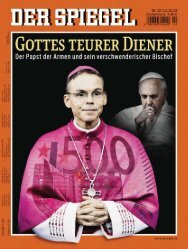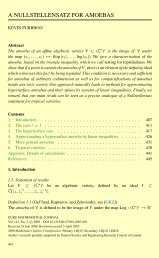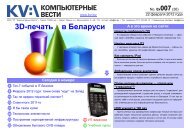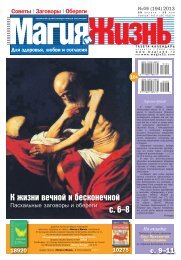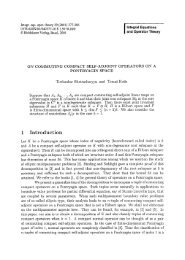computing lives - FTP Directory Listing
computing lives - FTP Directory Listing
computing lives - FTP Directory Listing
Create successful ePaper yourself
Turn your PDF publications into a flip-book with our unique Google optimized e-Paper software.
A<br />
Computer Previous Page | Contents | Zoom in | Zoom out | Front Cover | Search Issue | Next Page M S BE<br />
aG<br />
F<br />
34<br />
PERSPECTIVES<br />
Increasing use and broader applicability. As awareness<br />
of CoCs grows, so also will their popularity. Moreover,<br />
as the legal community becomes more familiar<br />
with CoC-based arguments, they will be applied<br />
more broadly. CoC expertise could become ubiquitous<br />
and perhaps as branded as the PMP designation<br />
from the Program Management Institute (www.pmi.<br />
org/CareerDevelopment/Pages/Obtaining-Credential.<br />
___ aspx). CoCs are not only easy to use, they are unambiguous<br />
about specific, holistic IT professional<br />
responsibilities—to the project, stakeholders, our<br />
profession, and society.<br />
Public codification of conduct standards by IT professionals.<br />
Evidence is mounting that public CoCs<br />
serve as standards for evaluating the performance<br />
and determining the responsibilities not only of IEEE<br />
members, but IT professionals in general. Organizations<br />
and professionals are using CoCs to determine<br />
specific attributes of compliance and noncompliance.<br />
Preventing and resolving disputes. Guidance to first<br />
prevent and subsequently settle disputes is generally<br />
welcome. CoCs provide objective particulars that litigants<br />
can use in a proactive manner. Following a CoC<br />
is one way to promote a successful project environment<br />
and insulate contracting parties from potential<br />
legal liability. In doing so, it is possible to identify critical<br />
prelitigation and other decision points that allow<br />
parties to better deal with or entirely avoid disputes.<br />
Better understanding of IT project implementation. The<br />
current dispute resolution process favors contractors.<br />
Understanding CoC utility enables organizations to<br />
rethink their relationships with clients. This could<br />
impact how organizations evaluate, select, and interact<br />
with IT professionals.<br />
Organization-wide CoC applicability. SECEPP is guided<br />
by the philosophy that CoCs generally apply to organizations—including<br />
those that do not have members<br />
belonging to the ACM or IEEE Computer Society—as<br />
well as to their leaders. The potential implications for<br />
organizations and leadership are staggering.<br />
Seeking a legal resolution to a dispute over contracted<br />
IT services is a growing trend. This is not surprising given<br />
the alarming statistic that up to 70 percent of IT projects<br />
fail (www.it-cortex.com/stat_failure_rate.htm). Litigation<br />
of software-intensive endeavors has been called a “major<br />
growth industry,” with forecasted legal costs rising “faster<br />
than any other aspect of software development.” 5<br />
As companies increasingly rely on IT systems to drive<br />
their business, failures and delayed implementations can<br />
cause costly ripples throughout their organization. Many<br />
are unwilling to absorb these costs and, consequently,<br />
expect IT professionals and especially their vendor partners<br />
to share responsibility.<br />
COMPUTER<br />
The evidence speaks for itself. Courts, juries,<br />
and arbitration panels are finding that failure<br />
to follow generally accepted public<br />
standards for design and testing of software<br />
are grounds for seeking damages. A<br />
wider understanding of the existence and usefulness of<br />
existing ethical and professional standards will represent<br />
added value to in-house IT managers and enhance the<br />
stature of IT professionals. An organization’s ability to<br />
evaluate conduct and, when appropriate, consider potential<br />
legal matters more knowledgeably is paramount to<br />
imposing accountability on all participants.<br />
Acknowledgments<br />
The authors express gratitude to the anonymous reviewers<br />
for their comments. They also thank the hundreds of<br />
unnamed data management and legal professionals with<br />
whom they have worked and who have contributed to a better<br />
understanding of this field as it is practiced and as it should<br />
be practiced.<br />
References<br />
1. V.Y. Yoon, P. Aiken, and T. Guimaraes, “Managing Organizational<br />
Data Resources: Quality Dimensions,” Information<br />
Resources Management J., July-Sept. 2000, pp. 5-13.<br />
2. P. Aiken and P. Piper, “Estimating Data Reverse Engineering<br />
Projects,” Proc. 5th Ann. Systems Reengineering Workshop,<br />
Naval Surface Warfare Center, 1995, pp. 133-145.<br />
3. P. H. Aiken, “Reverse Engineering of Data,” IBM Systems J.,<br />
Apr. 1998, pp. 246-269.<br />
4. D. Gotterbarn, “How the New Software Engineering Code<br />
of Ethics Affects You,” IEEE Software, Nov./Dec. 1999, pp.<br />
58-64.<br />
5. T. DeMarco and T. Lister, “Both Sides Always Lose: Litigation<br />
of Software-Intensive Contracts,” CrossTalk, Feb. 2000;<br />
www.stsc.hill.af.mil/crossTalk/2000/02/demarco.html.<br />
Peter Aiken is an associate professor of information systems<br />
at Virginia Commonwealth University and founding<br />
director of Data Blueprint, a data management consulting<br />
firm based in Richmond, Virginia. Contact him at _____<br />
peter@<br />
datablueprint.com.<br />
Robert M. Stanley is a senior member of the technical<br />
staff and a project lead specializing in project and quality<br />
management for Data Blueprint. Contact him at _______ bstanley@<br />
datablueprint.com.<br />
Juanita Billings is a senior member of the technical staff<br />
and a project lead specializing in legal support, systems<br />
analysis, and project management for Data Blueprint. Contact<br />
her at jbillings@datablueprint.com.<br />
___________________<br />
Luke Anderson is a law partner specializing in technology<br />
and intellectual property matters with Duane Morris<br />
LLC in Atlanta, Georgia. Contact him at ________<br />
landerson@<br />
duanemorris.com.<br />
Selected CS articles and columns are available for free at<br />
http://ComputingNow.computer.org.<br />
A<br />
Computer Previous Page | Contents | Zoom in | Zoom out | Front Cover | Search Issue | Next Page M S BE<br />
aG<br />
F




